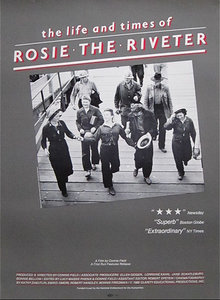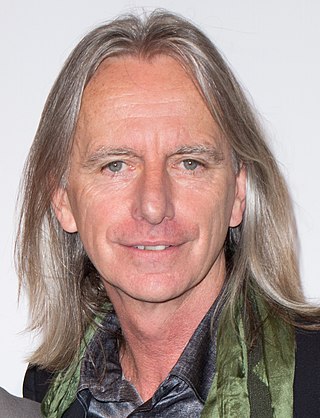Related Research Articles

John Thomas Sayles is an American independent film director, screenwriter, editor, actor, and novelist. He is known for writing and directing the films The Brother from Another Planet (1984), Matewan (1987), Eight Men Out (1988), Passion Fish (1992), The Secret of Roan Inish (1994), Lone Star (1996), and Men with Guns (1997).

The cinema of Australia had its beginnings with the 1906 production of The Story of the Kelly Gang, arguably the world's first feature film. Since then, Australian crews have produced many films, a number of which have received international recognition. Many actors and filmmakers with international reputations started their careers in Australian films, and many of these have established lucrative careers in larger film-producing centres such as the United States.

The Life and Times of Rosie the Riveter is a 1980 documentary film and the first movie made by Connie Field about the American women who went to work during World War II to do "men's jobs." In 1996, it was selected for preservation in the United States National Film Registry by the Library of Congress as being "culturally, historically, or aesthetically significant."
This is a list of films by year that have received an Academy Award together with the other nominations for best documentary short film. Following the Academy's practice, the year listed for each film is the year of release: the awards are announced and presented early in the following year. Copies of every winning film are held by the Academy Film Archive. Ten films are shortlisted before nominations are announced.
Orion Releasing, LLC is an American film production and distribution company co-owned by Amazon through Amazon MGM Studios. In its original operating period, the company produced and released films from 1978 until 1999 and was also involved in television production and syndication throughout the 1980s until the early 1990s. It was formed in 1978 as a joint venture between Warner Bros. and three former senior executives at United Artists. From its founding until its buyout by MGM in the late 1990s, Orion was considered one of the largest mini-major studios.

The Burke and Wills expedition was organised by the Royal Society of Victoria in Australia in 1860–61. It initially consisted of 19 men led by Robert O'Hara Burke, with William John Wills being a deputy commander. Its objective was the crossing of Australia from Melbourne in the south to the Gulf of Carpentaria in the north, a distance of around 3,250 kilometres. At that time most of the inland of Australia had not been explored by non-Indigenous people and was largely unknown to the European settlers.
Sky Trackers is a 26-part science-based Australian children's television adventure series, and a stand-alone children's television movie of the same name, which feature the adventures of children who live at space-tracking stations in Australia. Both series and telemovie were created by Jeff Peck and Tony Morphett, and executive-produced by Patricia Edgar on behalf of the Australian Children's Television Foundation (ACTF).

Charles Edward Chauvel OBE was an Australian filmmaker, producer and screenwriter and nephew of Australian army General Sir Harry Chauvel. He is noted for writing and directing the films Forty Thousand Horsemen in 1940 and Jedda in 1955. His wife, Elsa Chauvel, was a frequent collaborator on his filmmaking projects.
Goldcrest Films is an independent British distribution, production, post production, and finance company. Operating from London and New York, Goldcrest is a privately owned integrated filmed entertainment company.

Robert Scott Hicks, known as Scott, is an Australian film director, producer and screenwriter. He is best known as the director of Shine, the biopic of pianist David Helfgott. Hicks was nominated for two Academy Awards. Other movies he has directed include the film adaptations of Stephen King's Hearts in Atlantis and Nicholas Sparks' The Lucky One.

Robert Tudawali, also known as Bobby Wilson and Bob Wilson, was an Australian actor and Indigenous activist. He is known for his leading role in the 1955 Australian film Jedda, which made him the first Indigenous Australian film star, and also his position as Vice-President of the Northern Territory Council for Aboriginal Rights.

The Royal Society of Victoria (RSV) is the oldest scientific society in Victoria, Australia.
The Top Ten Money Making Stars Poll were polls on determining the bankability of movie stars. They began quite early in the movie history. At first, they were popular polls and contests conducted in film magazines, where the readers would vote for their favorite stars, like the poll published in New York Morning Telegraph on 17 December 1911. Magazines appeared and disappeared often and among the most consistent in those early days were the polls in the Motion Picture Magazine.
This annotated bibliography is intended to list both notable and not so notable works of English language, non-fiction and fiction related to the sport of roller derby listed by topic and format, and then year. Although 100% of any book listed is not necessarily devoted to roller derby, all these titles have significant roller skating and roller derby content. Included in this bibliography is a list of classic texts, roller derby history texts and roller derby local league created materials devoted to roller derby.
The Secret Country: The First Australians Fight Back is a 1985 television documentary made for the British Central Independent Television company by writer/presenter John Pilger and producer/director Alan Lowery. It details the persecution of Aboriginal Australians and Torres Strait Islanders throughout Australia's history.
Blood Brothers is a 1993 four-part Australian documentary film series that tells the stories of three different Aboriginal Australian men, and an Aboriginal ceremony.
Umbrella Entertainment is an Australian film distribution company that began operating in 2001. It is based in Kew, Victoria.
References
- 1 2 3 "Birth of the red kangaroo (1965)". CSIRO. Retrieved 19 January 2020., Silver Award, Australian Film Festival (1963); Orbit Award, ANZAAS (1966)
- ↑ Hughes, John (2018). "From cold war to hot planet: Australia's CSIRO film unit". Studies in Documentary Film. 12 (1): 72–96. doi:10.1080/17503280.2017.1420416. S2CID 158840016.
- 1 2 "The computer "CSIRAC" (1965)". CSIRO. Retrieved 19 January 2020.
- 1 2 "Window into space: the Parkes radio telescope (1965)". CSIRO. Retrieved 19 January 2020. Bronze Award, ISFA Padua (1965)
- 1 2 "Flight Line One: Controlled Burning from Aircraft (1971)". CSIRO. Retrieved 19 January 2020.
- ↑ "Bird banding in Australia (1964)". CSIRO. Retrieved 19 January 2020.
- 1 2 "A skeleton in the crop (1969)". CSIRO. Retrieved 19 January 2020.
- ↑ The second Bindibu expedition
- ↑ Thomson, Donald (1975). Bindibu Country. Melbourne: Nelson. pp. 129–154. ISBN 0170050491.
- ↑ "The Bindibus". The Australian Women's Weekly: 10–13. 22 January 1964. Retrieved 4 May 2020.
- ↑ "1968, English, Sound, Other sound, Video edition: People out of Time British Broadcasting Corporation (Production company)". National Library of Australia. Retrieved 25 January 2020.
- ↑ "Donald Fergusson Thomson". University of Melbourne. Retrieved 19 January 2020.
- ↑ "Production Survey". Cinema Papers (23): 81–83. Retrieved 4 May 2020.
- ↑ Morgan, David G. (1967). Biological Science: The Web of Life. Australian Academy of Science.
- ↑ "1973, English, Video edition: The Waterhole". National Library of Australia. Retrieved 25 January 2020.
- 1 2 3 4 "1973, English, Video edition: The Waterhole". National Library of Australia. Retrieved 25 January 2020., AFI Jedda award (1973)
- ↑ "1984, English, Video, Captioned edition: Egg laying mammals : the echidna and platypus [videorecording]". National Library of Australia. Retrieved 25 January 2020., Chris Plaque, Columbus Film Festival (1985); Merit Award, Wildlife Film Festival, Montana, US (1985); Creative Excellence award, US Film Festival, Illinois (1983)
- ↑ "1982, English, Video edition: Desert hopping mouse [motion picture] / Educational Media International in conjunction with The Australian Academy of Science. School Biology Project". National Library of Australia. Retrieved 25 January 2020., Silver Award, Australian Conservation Foundation (1983)
- 1 2 "1900, English, Government publication, Video edition: The wetlands problem [motion picture]". National Library of Australia. Retrieved 25 January 2020.
- ↑ "1979, English, Video edition: Animals of Australia [videorecording] / editing and script by David Corke; production by Ken Widdowson". National Library of Australia. Retrieved 25 January 2020.Creative Excellence Award, US Film Festival (1979); Award of Merit, Information Film Producers, USA (1979); Award of Merit, US Industrial Film Festival (1979)
- 1 2 "Yirrititja [videorecording] : the way of the desert people". National Library of Australia. Retrieved 19 January 2020.
- 1 2 "1973, English, Government publication, Video edition: Shed tears for the river [motion picture]". National Library of Australia. Retrieved 25 January 2020., sponsored by South Australian Film Corporation
- 1 2 "Shed Tears for the River - Review". Ozmovies. Retrieved 4 May 2020.
- ↑ "1971, English, Video edition: Eudyptula minor! [motion picture]". National Library of Australia. Retrieved 25 January 2020., sponsored by Comalco
- ↑ Partners in Disaster, the story of Burke and Wills. Thomas Nelson Australia. 1985. ISBN 978-0-17-006496-5.
- ↑ Corke, David (2016). "Brahe's Cache" (PDF). Victorian Historical Journal. 87/1 (285): 58–75. Retrieved 19 January 2020.
- ↑ Corke, David (June 1994). "Where did they Bury Charlie Gray?". Victorian Historical Journal. 65/1 (24): 45–56.
- 1 2 "Burke and Wills Historical Society".
- ↑ "1956, English, Government publication, Video edition: Raak [motion picture]". National Library of Australia. Retrieved 25 January 2020., British International Amateur Film Festival, top amateur film prize (1957)
- ↑ Corke, David (1956). "Photographing the wedge-tailed eagle". Walkabout. 22 (5): 15–18. Retrieved 19 January 2020.
- ↑ "1959, English, Video edition: Edge of the deep, Boolari Films (Production company); Peter Bruce (Co-director); David Corke (Co-director)". National Library of Australia. Retrieved 25 January 2020.
- ↑ "Past Awards". AFI, AACTA. Retrieved 26 January 2020.
- ↑ "1962, English, Video edition: Baama: land of the red gums, Boolari Films (Production company); State Film Centre of Victoria (Production company)". National Library of Australia. Retrieved 25 January 2020., Commendation Australian Film Institute (1961)
- ↑ "1963, English, Video edition: Sunset country, State Film Centre of Victoria (Production company); David Corke (Producer/director)". National Library of Australia. Retrieved 25 January 2020.
- ↑ "Bird banding in Australia (1964)". CSIRO. Retrieved 19 January 2020.
- ↑ "1971, English, Video edition: Eudyptula minor! [motion picture]". National Library of Australia. Retrieved 25 January 2020., sponsored by Comalco
- ↑ "1973, English, Video edition: The Waterhole". National Library of Australia. Retrieved 25 January 2020.
- ↑ "1979, English, Video edition: Animals of Australia [videorecording] / editing and script by David Corke; production by Ken Widdowson". National Library of Australia. Retrieved 25 January 2020.Creative Excellence Award, US Film Festival (1979); Award of Merit, Information Film Producers, USA (1979); Award of Merit, US Industrial Film Festival (1979)
- ↑ "1982, English, Video edition: Desert hopping mouse [motion picture] / Educational Media International in conjunction with The Australian Academy of Science. School Biology Project". National Library of Australia. Retrieved 25 January 2020., Silver Award, Australian Conservation Foundation (1983)
- ↑ "1984, English, Video, Captioned edition: Egg laying mammals : the echidna and platypus [videorecording]". National Library of Australia. Retrieved 25 January 2020., Chris Plaque, Columbus Film Festival (1985); Merit Award, Wildlife Film Festival, Montana, US (1985); Creative Excellence award, US Film Festival, Illinois (1983)
- ↑ "ACS Accredited Member List". Australian Cinematographers Society. Retrieved 19 January 2020.